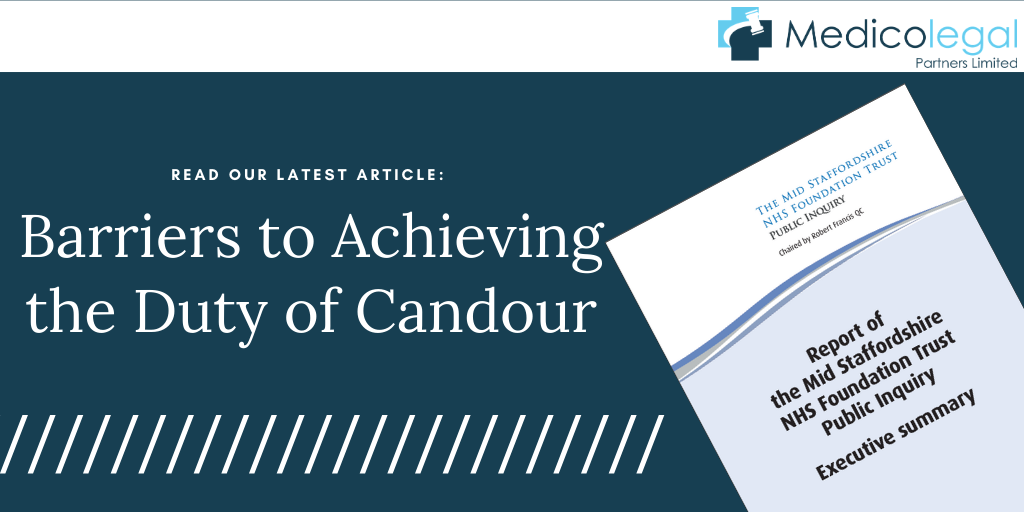
This is the third in a series of four articles on The Francis Report and its impact. We have explored the background to the report and how health providers achieve the duty of candour. This article explores the barriers to its use, and the final article in the series will discuss The Francis Report’s impact on medical practice.
The statutory duty of candour was introduced for NHS providers in November 2014 and extended to cover all other health and social care providers, such as GPs, in April 2015. It does not refer to recognised complications that occur as part of the natural course of an illness, but specifically to safety incidents arising through the provision of care for the patient. The legislation was intended to ensure that healthcare providers are always open and honest with patients when things go wrong. However, there may be several reasons why it is not always possible to achieve the duty of candour.
Doctors have always had an ethical duty to be open with their patients, admitting when things have gone wrong, putting them right and offering an apology. While this contractual duty applies to individuals, the new statutory duty applies only to healthcare institutions. In the absence of a clear definition as to precisely which types of incident fall within the contractual or statutory duty, or both, whether or not an incident is ever reported to a patient may depend entirely on the judgement of an NHS manager.
Another major barrier towards attaining candour is the fear of litigation. However, it is important to understand that an apology and explanation is not an admission of liability. In reality, an early apology is likely to prevent a lengthy claim, which may be driven in part by the patient’s desire to know what happened and to receive reassurance that action will be taken to prevent such an incident from ever happening again. While the Duty of Candour legislation was designed to reduce the risk of patient harm, incidents do still occur. Although attributing blame should be discouraged, particularly as most adverse events arise due to multiple factors which are not the fault of any one individual, staff may be reluctant to report genuine concerns. Often, whistle-blowing is seen as career-ending and individuals who do so may be bullied or harassed. Therefore, it is important that organisations investigate any incidences where a staff member is undermined or obstructed in implementing their professional responsibilities. There should be a process in place for dealing with breaches of the duty of candour along with proper legal safeguards to protect whistle-blowers from dismissal or victimisation once they have raised an issue.
The legislation also raises questions about what should happen if an incident occurs against a backdrop of a pending investigation into concerns over an individual doctor or surgeon, where the surgeon lacked experience in the procedure performed, or where an individual has raised concerns over lack of resources or systemic problems in the place where the treatment was carried out. All of these issues, whether in isolation or collectively, might be involved in causing a notifiable safety incident and if the legislation is to have its full meaning, patients should be informed of the part that each factor may have played in the incident.
When the legislation was introduced, it was feared that compliance might simply become a box-ticking exercise, with the use of standard letters and formulaic responses. Strong leadership is vital if the duty of candour is to be implemented fully and organisations need to promote an open and fair environment that encourages staff to report safety incidents and to support each other. However, a recent review into the deaths of patients in acute community and mental health care at NHS trusts found that the quality of investigations into individual deaths was often poor. In particular, those appointed to lead the investigations were often untrained, communication was lacking and confusion about timelines and guidance was common. In order to improve this situation, Trusts need to learn from their mistakes, from both a clinical perspective and in the way that any incidents are handled. Training needs to be improved throughout organisations to allow a multi-disciplinary approach.
The success of the duty of candour legislation will also depend on strong regulation by the Care Quality Commission (CQC). From inspections undertaken during the first year after the new requirements came into force, it became clear that a more systematic approach was needed to assess how effectively organisations are integrating the duty as part of a wider approach to learning from safety incidents. Furthermore, this rather inconsistent approach did not help providers to fully understand the regulations and requirements of the duty. Since then, the inspection methodology has been improved and this now allows the CQC to follow a more robust and consistent approach in assessing compliance with the regulations when they undertake hospital inspections. However, issues remain and it is not yet clear whether the CQC can be relied upon to enforce the legislation. A particular concern is the factual accuracy of statements made to patients and families. As the CQC does not investigate individual cases, it is hard to see how they can be certain that the facts of any case are correct.
Medical care will never be entirely risk free, but when an incident does occur, the response should be honest and prompt. The duty of candour should not be thought of simply as a matter of compliance to the relevant legislation but rather as part of a wider commitment to safety and learning.
About Medicolegal Partners
Medicolegal Partners work with well renowned clinicians who are recognised as leaders in their respective field of medicine by their profession, peer group and patients. Find out more about our experts and their areas of expertise.
Further reading:
https://www.rcseng.ac.uk/standards-and-research/standards-and-guidance/good-practice-guides/duty-of-candour/
https://www.theguardian.com/healthcare-network/2014/apr/08/duty-of-candour-nhs
READ THE FINAL ARTICLE IN OUR SERIES: THE IMPACT OF THE Francis Report
